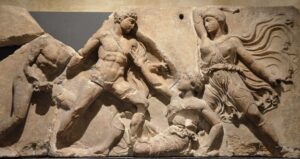μετὰ δὲ τὸν ἀγῶνα τοῦτον ἐπέταξεν αὐτῷ Σολύμοις μαχεσθῆναι. ὡς δὲ ἐτελεύτησε καὶ τοῦτον, Ἀμαζόσιν ἐπέταξεν ἀγωνίσασθαι αὐτόν. ὡς δὲ καὶ ταύτας ἀπέκτεινε, τοὺς γενναιότητι Λυκίων διαφέρειν δοκοῦντας ἐπιλέξας ἐπέταξεν ἀποκτεῖναι λοχήσαντας. ὡς δὲ καὶ τούτους ἀπέκτεινε πάντας, θαυμάσας τὴν δύναμιν αὐτοῦ ὁ Ἰοβάτης τά τε γράμματα ἔδειξε καὶ παρ᾽ αὐτῷ μένειν ἠξίωσε: δοὺς δὲ τὴν θυγατέρα Φιλονόην καὶ θνήσκων τὴν βασιλείαν κατέλιπεν αὐτῷ.
- Map
- Pre Reading
- Post Reading
- Culture Essay
N/A
Why does Proetus send Bellerophon to Iobates rather than punish him for alleged sexual advances toward his wife Sthenoboea?
How many times is Bellerophon accused of βία violence in this story? Is he simply in the wrong place at the wrong time? Is he a good person? In the eyes of the ancient mythographers, is he a hero? Explain.
The Bibliotheca does not recount how Bellerophon obtains Pegasus or that he flies dangerously close to the sun, but emphasizes that the winged steed is already his own. What words in the Greek emphasize Bellerophon’s possession of the horse? Why do you think the Library omits these parts of the Bellerophon’s exploits?
Compare Bellerophon’s story with Theseus’ labors. Both stories might be considered coming of age stories. Consider what event launches each story, who imposes the tasks along the way, and how each one is resolved. What is the goal or telos of each story?
Prepare to say the entire Bellerophon story aloud in Greek, but for every pronoun, substitute the appropriate noun to which the pronoun refers.
